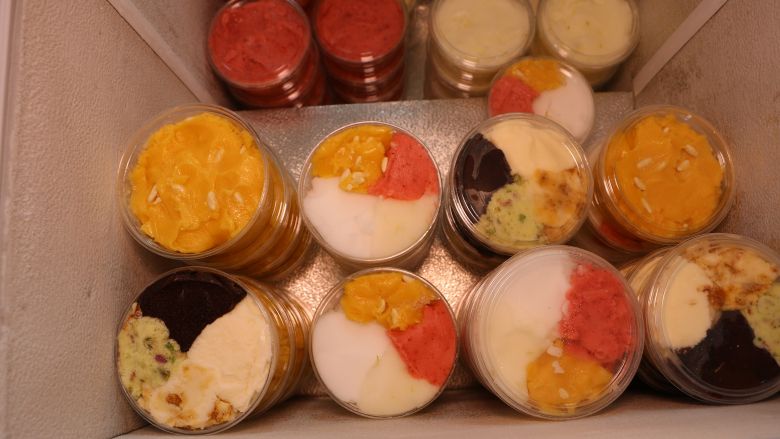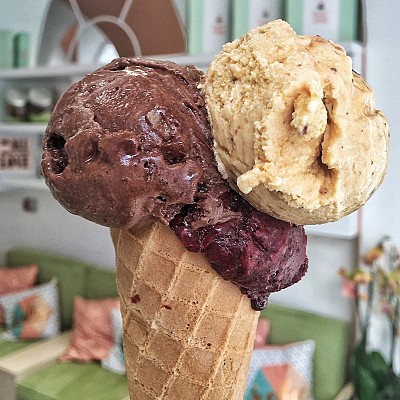Fruits in season are all that Mitri Hanna Moussa, owner of Al Salam Sweet Parlor in Beirut, uses to produce his sought after Arabic gelato. The reputation of his mouthwatering ice cream has reached far and wide, with international media outlets calling it one of the world's best.

By Mostapha Raad
Nearly seven decades ago, a young man launched his own sweets parlor on a narrow street in eastern Beirut’s upscale Achrafieh district in 1949.

Hana Mitri Moussa stands in front of the shop his father opened back in 1949. Nothing has changed about Al Salam since then, including his family’s secret recipe for the ice cream.
Hanna Mitri Moussa named his shop Al Salam, Arabic for peace, way before Lebanon struggled with its 15-year civil war that started in 1975. The name was derived from a Lebanese soccer team which trained close to his parlor.
Little did Moussa know that his one-room store will go on to become a worldwide hit for one specific delicacy: ice cream.
International media outlets have dubbed Al Salam as one of the best ice cream parlors in the region, and one of Lebanon’s hidden gems.
Nothing has changed over the past 67 years at Moussa’s shop. Even the marks from bullets that sprayed the old building where Al Salam is located during the Lebanese civil war remain visible.
The only thing that has changed is that Moussa now runs his late father’s shop, after the latter passed away in 2012. And he has carried on his father’s legacy well by continuing to produce the most delicious traditional Arabic ice cream, based on a secret family recipe that was passed on from father to son.
The shop opens daily from 8 a.m. and closes at 7:30 p.m. Moussa brags that the parlor never closed during the civil war, despite bombs, some of which fell nearby.
“It was another normal working day for my father, when the shelling of eastern Beirut by the Syrian army [shattered the glass of his shop]. One of the Christian fighters tried to warn my father from heading to the shop that day, but my dad insisted on opening [shop] according to his regular working schedule,” Moussa tells Newsweek Middle East.
Moussa’s father didn’t care much, he cleaned up the broken glass and “continued work as if nothing has happened,” he says with a smile, while gesturing at the small shop’s only glass facade.
There is one narrow door for the customers to walk in, pick up their order, and leave. The 3-meter square store has no space to accommodate an eat-in style parlor, but there isn’t a moment that the shop is void of customers who walk in at different times of the day to get their ice cream fix.
“I get customers in the morning whose breakfast is my ice cream,” Moussa proudly tells Newsweek Middle East.
Though he occasionally produces other types of sweets during holidays, such as maamoul(Lebanese date-filled biscuits), it is still ice cream that makes Al Salam stand out from its competitors.
One thing that Moussa’s customers know for sure is that he will not compromise on the quality of ingredients he uses in making his delicious treats.
The fruits he uses to produce his gelato-like ice cream must be fresh and in season—two key factors that Moussa ensures about his produce.
“The taste of strawberries at the beginning of the strawberry season varies from their case towards the middle or end of their season,” Moussa says as he scoops a lemon-flavored ice cream ball into a biscuit cone, before handing it over to one of his customers.
“The source of the fruit itself is also vital in determining its flavor,” he adds, explaining that after washing and sterilizing the fruits, he waits for them to dry naturally before he turns them into natural ice creams and sorbets without any chemicals or additives.
At the moment, Moussa produces eight flavors —four sorbets, and four that are milk based.
Al Salam’s sorbets are flavored with lemon, rosewater, strawberries, and apricots with pine seeds.
As I stand close by to take photos, Moussa stirs the milk, which he boils in an aluminium cooker for over an hour, sometimes two, to thicken the milk by adding mastic —a resin produced by trees and used to produce chewing gum— and a special powder known as sahlab, derived from the grounded root tubers of a Mediterranean orchid called “the naked man orchid.”
The result is a heavenly ice cream with rich flavors and smell, that is not only tantalizing to the taste and smell buds, but can also turn into a serious addiction as soon as you take the first bite.
Aside from the sorbets, Al Salam offers milk-based ice cream which comes in the following flavors: pistachio, chocolate, caramel and croquant—an almond-brittle batter with milk ice cream.
Moussa also produces seasonal flavors based on the availability of the ingredients, including watermelon, cantaloupe, mango, oranges and others.
“I buy the mango from some farmers in Cote d’Ivoire, which are organic, haven’t been sprayed by any chemicals or are genetically modified. My mission is to create real ice cream and not an artificial product,” he adds.
To make sure he serves all his customers, Moussa wakes up early in the morning to prepare the fruits with his mother. The word additives does not exist in his dictionary.
It is perhaps the natural flavors, his refusal to change the shop’s decor since 1949, including the sign board above the shop that is rusting and askew, and his traditional way of producing ice cream that has garnered the attention of international media to visit his shop and write about it.
This includes a report prepared by the New York Times, years back, comparing Moussa’s way of manufacturing ice cream to an Italian lady who continues to produce gelato in New York City the way her grandfather used to make it.
Al Salam Sweets is also mentioned in the Wall Street Journal’s report on the 10 best sweets parlors in the world. And the reports continue from U.K.’s Guardian newspaper to France’s Paris Match and Le Figaro. Apart from print media, broadcast television channels such as CNN and TV5 took interest in Moussa’s shop and were curious to learn why he is the best ice cream maker in the region.
At the moment Moussa’s shop is listed on the website Trip Advisor as one of the best sweet shops in Lebanon.

ICE CREAM KING: Moussa tells Newsweek Middle East that he has no interest, neither the time, to promote his business on social media. Al Salam’s popularity spread by word-of-mouth through his customers, and he is content with that.
But despite all this fame, Moussa remains reluctant from entering the world of social media and says he has no time for that.
“The word of mouth put out there by my loyal customers is more than enough,” he says.
However, Moussa plans to move his shop for the very first time in seven decades to a new location soon “because of the deteriorating situation of the building,” he tells Newsweek Middle East.
The secret of making the delicious treats will move with him, but perhaps it won’t be passed on to the next Moussa generation.
At the moment, none of his three children, a boy and two girls, help him with work.
“I will not force them into this. They have studied specific majors, and it is their choice,” he adds.







































